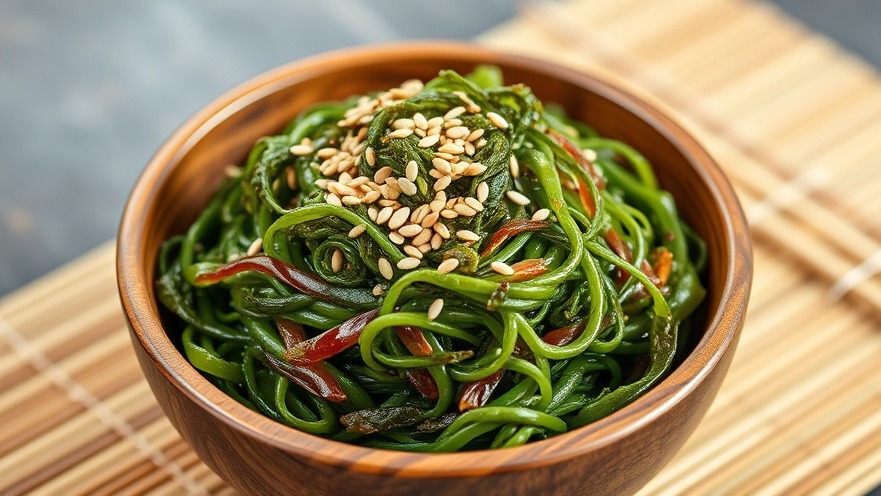
Wakame: A Solution for Sustainable Hospitality
In recent years, a fascinating transformation has occurred in the world of sustainable food systems, with wakame—a type of edible seaweed—emerging as a star player. Once deemed an invasive aquatic pest in some regions, wakame is now regarded as an integral part of a regenerative food system. This shift offers meaningful insights for boutique hospitality professionals aiming to integrate sustainability into their businesses.
Why Boutique Hospitality Should Care About Wakame
The culinary versatility and environmental benefits of wakame present an exciting opportunity for boutique hotels, eco-lodges, and Airbnb hosts looking to enhance their menus while promoting sustainable practices. Sourcing local ingredients like wakame not only reduces transportation emissions but also supports coastal communities by creating a thriving market for regional seaweed harvesting. Incorporating wakame into the menu can make a dish not only flavorful but also a conversation starter—creating a unique guest experience in the process.
Historical Context: From Pest to Resource
Historically, wakame has had a contentious reputation. While it proliferated in waters across Japan and Korea as a prized food source, its growth often spiraled out of control in non-native ecosystems, disrupting local marine life. However, recent awareness of its potential for culinary and environmental benefits has prompted a reevaluation. Cultivating wakame on a broader scale aligns with principles of the circular economy by utilizing a resource that has historically been viewed as waste.
Future Trends: What to Expect in Sustainable Hospitality
The adoption of wakame and other seaweeds represents a burgeoning trend in eco-conscious hospitality. As more consumers prioritize sustainability in their travel choices, hotels that offer unique, locally-sourced menu items will likely attract a dedicated clientele. Additionally, incorporating sustainable packaging, meal options, and waste elimination strategies around seaweed dishes can further bolster a hotel’s eco-credentials.
Unique Benefits of Embracing Wakame
Wakame is packed with nutrients, offering health benefits such as boosting metabolism, aiding digestion, and providing a rich source of vitamins. For hospitality professionals, featuring nutrient-dense options can enhance guests' experiences and set up a strong brand identity focused on sustainability and health. By embracing innovative ingredients like wakame, boutique hospitality venues can diversify their offerings and create memorable culinary experiences.
Actionable Insights for Business Sustainability
Incorporating wakame into a restaurant menu can seem daunting, but there are practical steps for implementation. Start with small menu additions, such as adding a wakame salad or using it in broths. Engage local suppliers to ensure fresh product sourcing, and share the story of wakame with guests. This not only builds an emotional connection but also places your establishment as a leader in sustainable gastronomy.
Community Impact: Tying In With Local Initiatives
The rise of wakame as a sustainable food source also opens doors for local initiatives. Partnering with environmental organizations for sustainable harvesting practices can enhance a hotel’s community involvement while tackling challenges such as waste reduction along the supply chain. It allows boutique hotels to create partnerships that embody corporate social responsibility.
Moving toward Zero Waste
The wakame model challenges the traditional expectations of food sources and aligns with zero waste initiatives. By utilizing all parts of the seaweed and implementing sustainable packaging, businesses can drastically minimize waste. This eco-friendly mindset not only revolutionizes the culinary experience for guests but also sets a standard for environmental stewardship in the hospitality industry.
Conclusion: A Call to Action for Boutique Hospitality
As the world shifts toward a more sustainable future, boutique hospitality professionals are perfectly positioned to be at the forefront of this change by incorporating innovations like wakame into their offerings. Embrace this opportunity to not only enhance the guest experience but also contribute to a regenerative food system. Consider how your business can integrate sustainable practices, and start today by exploring the culinary versatility of wakame.
 Add Row
Add Row  Add
Add 




Write A Comment